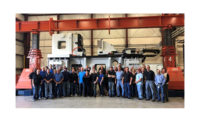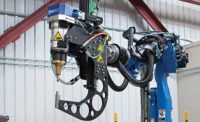Lightweighting is one of the biggest challenges facing manufacturers today in the automotive, aerospace, maritime and rail industries. The push for new materials is forcing engineers in these industries to explore cost-effective alternatives and develop new assembly processes.
These materials include aluminum, carbon-fiber composites, high-strength steel, magnesium, titanium, scandium and various types of foam, plastic and rubber. All of them are helping manufacturers produce lighter, faster, safer and more-fuel-efficient vehicles.
To expand the implementation of lightweight metal manufacturing technologies in U.S. factories, the Lightweight and Modern Metals Manufacturing Innovation (LM3I) Institute was founded in Detroit in early 2014. Its members include EWI, the University of Michigan and The Ohio State University.
Within a year, LM3I changed its name to LIFT (Lightweight Innovations for Tomorrow). It also opened a 100,000-square-foot facility and immediately began performing materials-related research projects.
In the fall of 2018, South Bend, IN-based Manufacturing Technology Inc. (MTI) provided LIFT with an LF35-75 linear friction welder. This welder is the first in North America capable of joining full-sized parts.
The machine weighs 122,000 pounds, measures 22 feet long by 8 feet wide by 14 feet high, and is installed in a pit in the floor of the LIFT facility. It has the largest tooling envelope of any linear friction welder in the world, allowing, for the first time, production of very large parts on this continent. Previously, companies interested in using such a large linear friction welder would have to travel to Europe.
In linear friction welding (LFW), one metal part is held stationary while the other oscillates on a linear path. This motion creates the force needed to enable parts with varying geometries at the weld interface to be joined.
The main benefit of LFW is it produces a bond that is as strong as the parent material without the distortion associated with fusion welding technologies and their huge heat-affected zones. LFW also prevents shrinkage, solidification cracking and porosity.
The technology is currently used in aerospace to produce lightweight blisks (integrally bladed rotors) for aircraft engines. But, LIFT and its partners will use the massive MTI welder to explore how LFW can benefit many other industries.
“We are thrilled to have this machine up and running,” says Dan Adams, president and CEO of MTI. “Our customers from the aerospace, automotive, defense, rail and mining industries have been looking for a machine that is capable of full-scale parts. Now they have it in Detroit.”
“This welder positions us to continue leading the industry into a smart manufacturing future,” notes Nigel Francis, CEO and executive director of LIFT. “We encourage companies, both large and small, from around the country to reach out to us to see how this machine and our other services can help them achieve their goals.”
MTI will run and maintain the machine at LIFT’s facility. The company will also complete customer-directed work on the machine and support any programs that LIFT has moving forward. However, MTI and LIFT will share capacity on the machine to best serve their North American customers.
For more information on friction welding technologies, call 574-230-0258 or visit www.mtiwelding.com.




